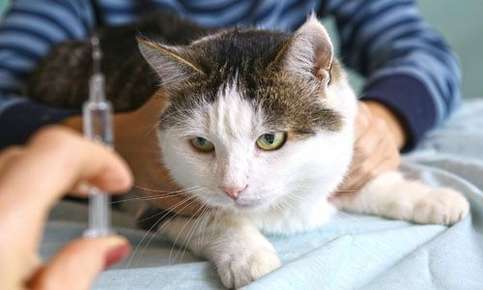
Diabetes in cats, also known as feline diabetes mellitus, is an increasingly common disease affecting 1 out of every 400 cats. Obesity is the leading risk factor for diabetes.
"Overweight or obese cats are two to four times more likely to develop diabetes than cats with a healthy body weight," says board-certified veterinary nutrition specialist Dorothy Laflamme, DVM, PhD, DACVN.
Warning Signs
Diabetes is a progressive disease. In the early stages, a cat may try to compensate for the body’s inability to metabolize glucose by increasing food consumption. Symptoms of early diabetes are frequent urination, increased thirst and appetite, and unexplained weight loss. Kidney disease and hyperthyroidism are two diseases that can mimic the symptoms of diabetes. A veterinarian can diagnose diabetes using blood and urine tests.
Treating Diabetes
All diabetic cats are started on insulin. Your veterinarian will decide which kind of insulin to use, what dose should be administered, and will show you how to give these injections at home. Don't worry, the needles are very small and many cats don't even know they're being injected. Your cat will need monitoring to determine the response to treatment, this may include both blood tests and indicators you use in the litter box. Dietary changes to a high protein, low-carbohydrate diet are essential to help diabetic cats regulate blood sugar levels. The good news is that 70% of these patients eventually do not need insulin.
Advanced Diabetes
Some cats may require hospitalization following a diabetes diagnosis. These cats are typically suffering from a condition known as diabetic ketoacidosis (DKA), which occurs when fatty-acid by-products build up in the blood stream. These byproducts, known as ketones, build up because of the cat’s inability to metabolize glucose. Symptoms of DKA include the smell of acetone on the cat’s breath (similar to nail polish remover), extreme lethargy, vomiting, and rapid, labored breathing.
Without intervention, a severely diabetic cat may slip into a diabetic coma and even die. Diabetes can also lead to other health complications, including kidney and bladder infections, abnormal gait due to a neuropathy, and muscle loss.
Life After Diagnosis
Most cats do not require hospitalization. Dietary changes and appropriate treatment can help manage diabetes. A low carbohydrate, high protein canned diet can help control diabetes and may even lead to remission. Your veterinarian can make specific dietary recommendations for your cat.
If you suspect that your cat may be diabetic, contact your veterinarian for an immediate appointment. Early diagnosis is essential to managing diabetes in cats. Dietary changes and appropriate treatment can help manage this condition in cats and prevent further health complications.
Sources:
American Animal Hospital Association

